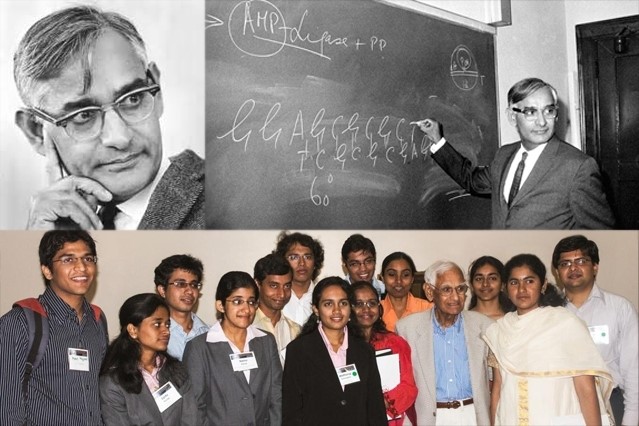
- A+
- A
- A-
Prof. Har Gobind Khorana was a Nobel Prize-winning biochemist and chemical biologist who made important contributions to the chemical synthesis of genetic materials. Born on 9th of January 1922, he was awarded the Nobel Prize in Physiology or Medicine along with Prof. Marshall Nirenberg and Prof. Robert Holley in 1968 for “for their interpretation of the genetic code and its function in protein synthesis”. Prof. Khorana was bestowed with Padma Vibhushan in 1969 by the Government of India.
On his 100th birth anniversary, Principal Scientific Adviser to the Government of India Prof. K. VijayRaghavan wrote a tribute-
“On Har Gobind Khorana’s 100th birthday we remember him: born in pre-partition India, worked in England, Switzerland, Canada, and the US. A popular account of his life and early work is an article by his friend and colleague Uttam RajBhandary in Resonance.
Khorana went to Berkshire, England on an agriculture ministry scholarship for his Ph.D. to study insecticides and fungicides, but the positions were already taken by returning war veterans. The Indian High Commission intervened and arbitrarily decided he should go to Liverpool for an organic chemistry Ph.D. as that was the area of his Master’s degree. A rare example of top-down bureaucratic intervention with positive outcomes.
Khorana went for a year, without a salary, to Zurich after his Ph.D. in 1948 to work with Vladimir Prelog where he discovered prior work on dicyclohexylcarbodiimide (DCC), “pivotal..for the synthesis of nucleotides and nucleotide coenzymes and in gene synthesis” (RajBhandary)
Unable to land a job in India in 1949, Khorana joined Todd’s laboratory in Cambridge, England, where he used “DCC as a powerful reagent for activation of phosphate esters and the synthesis of nucleoside pyrophosphates” (RajBhandary)
From Cambridge, Khorana moved to UBC in Vancouver. To a job that “offered freedom but no facilities” and based the view that organic chemistry research was inexpensive “requiring only test tubes”. The best chemists flocked to his lab to learn his synthesis methods. These foundations allowed Khorana and his team to do their pathbreaking work in several areas. At the University of Wisconsin, work from his lab help unravel the genetic code, then the first chemical synthesis of a gene.
At MIT, where he moved to in 1970 his lab “synthesized a suppressor tRNA gene and showed that the synthetic gene was functional in a bacterium, another landmark achievement in genetics.” “He then switched to working on membranes, membrane proteins and signal transduction, problems in which he worked for more than thirty years until his retirement in 2007.”

Pic Credit: Massachusetts Institute of Technology (MIT) USA
RajBhandary says Khorana followed Otto Loewi’s maxim “We must be modest except in our aims”, and that he was friendly and approachable. True, though strangers assumed otherwise and kept a distance. He worked hard and expected his colleagues to do so too. A former postdoc recounted how he spilled 3H (Tritium) on his bench and dressed up in a protective suit to clean up slowly from end to end. Walking by Khorana grabbed some tissue, cleaned the spill in a few seconds, and said “There, it won’t eat you”.
Khorana’s anniversary is time to relook the history of molecular biology. One school—Brenner, Jacob, Benzer, etc—set store on hard thinking, with simple, elegantly designed experiments in phage and bacteria that predicted details often without having to look inside cells. The other school—Khorana, Nirenberg, Kornberg, Sanger too, and their ilk—did not shy from hard work and hard thinking, and contributed by exquisite and sometimes difficult, chemistry and biochemistry.
Horace Freeland Judson’s masterpiece, “The Eighth Day of Creation” is a gripping tale even today, of how biologists began to open the box of understanding nature’s engineering. A must-read and puts Khorana's impressive work in context.”

Pic Credit: University of Wisconsin USA
References:
1. Uttam L. RajBhandary, Har Gobind Khorana: Early Years in Science and Transition from Chemistry to Chemical Biology, Resonance
2. Nobel Prize, The Nobel Prize in Physiology or Medicine 1968. Available on: The Nobel Prize in Physiology or Medicine 1968 NobelPrize.org. (Accessed on Jan 09, 2022)




